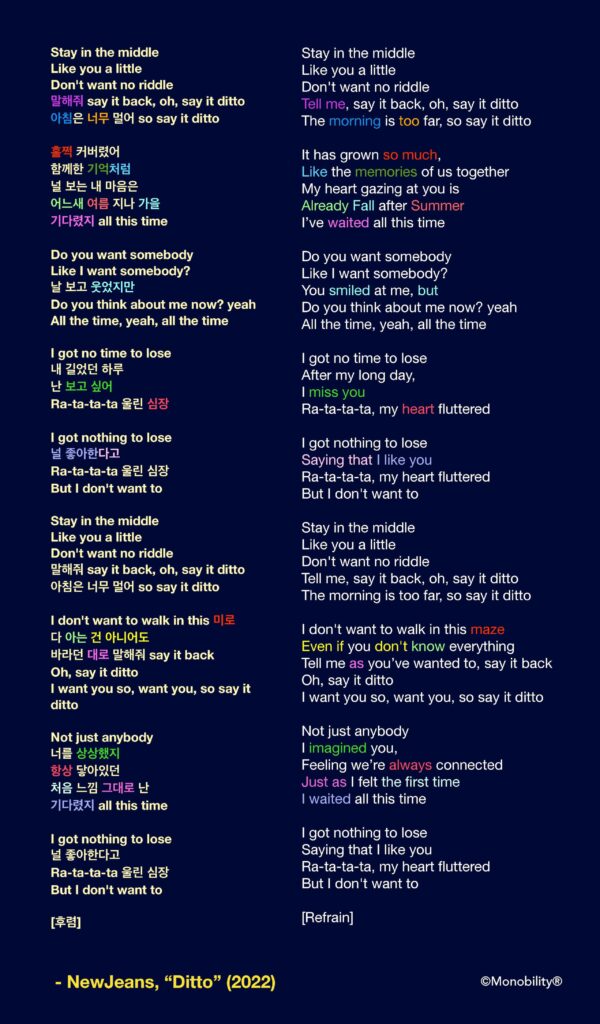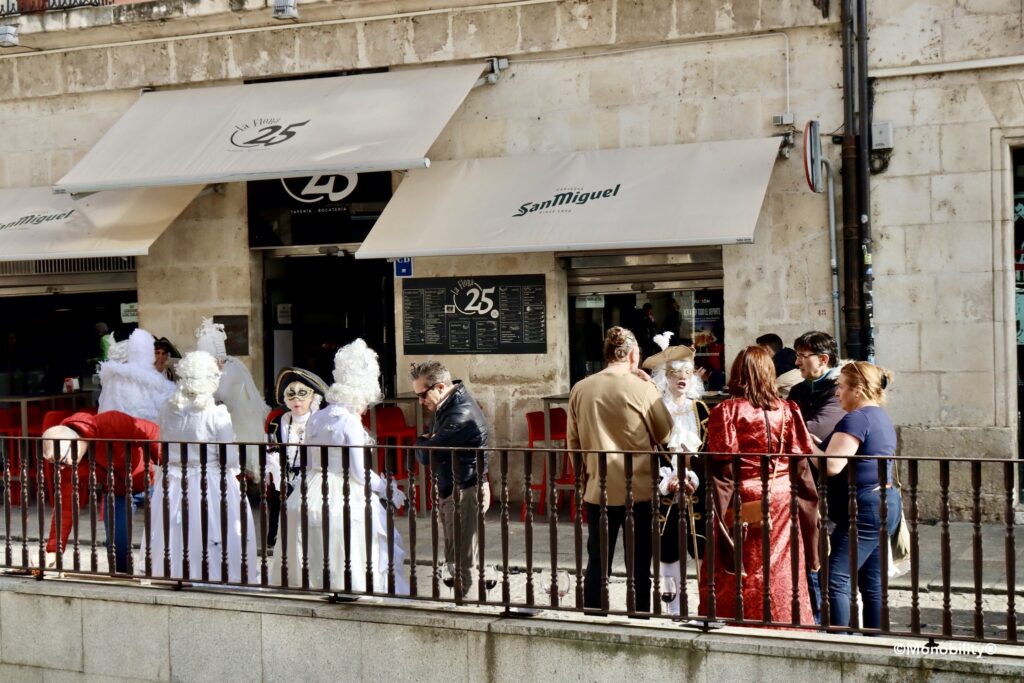Rhyme is a concept reserved for poetry in European languages, generally speaking. It is not often used in Korean poetry, mainly due to the agglutinative characteristics of the Korean language which ends most sentences with a set of common particles. Think about it. Korean sentences usually end with -다, -요, etc. Anybody, even a little child, could write a Korean poem with perfect rhymes with -다 or -요. In other words, rhyming in Korean would be too easy for a talented poet to use as a requirement for good poems in Korean. Instead, modern Korean poetry puts more importance on lyricism and content itself, rather than classical rules and techniques. Well, except for rhythm and meter, which have had great significance in the Korean classical poetry form 시조 (sijo) since the Middle Ages during the Goryeo Dynasty (918 – 1392). You can get a glimpse of the classical Korean meters in two of the famous sijo examples below:
이런들 어떠하며 저런들 어떠하리 [ 3-4-3-4 ]
만수산 드렁칡이 얽혀진들 어떠하리 [ 3-4-4-4 ]
우리도 이같이 얽혀져 백 년까지 누리리라 [ 3-6-4-4 ]
– 태종 이방원 (1367 – 1422), “하여가(何如歌)” [ 이방원, who was to become the 3rd king of the Joseon Dynasty, tried to persuade 정몽주, the senior courtier of the fallen Goryeo Dynasty, to join the new royal government by writing this sijo to him. ]
이 몸이 죽고 죽어 일백 번 고쳐죽어 [ 3-4-3-4 ]
백골이 진토 되어 넋이라도 있고 없고 [ 3-4-4-4 ]
임 향한 일편단심이야 가실 줄이 있으랴 [ 3-6-4-3 ]
– 포은 정몽주 (1338 – 1392), “단심가(丹心歌)” [ By writing back this sijo to the future king, 정몽주 proclaimed his unwavering loyalty to his fallen king and Goryeo Dynasty, essentially refusing the offer above. Soon after that, he was brutally assassinated. ]
We can look at more examples of 시조 someday in the future. In the meantime, for your info:
https://en.wikipedia.org/wiki/Sijo
Many centuries later, today’s Koreans write and sing K-pop in both Korean and English, often mixing the two vastly different languages in one sentence. Alas, so many of those K-pop songs are loaded with a bunch of Konglish (Korean-style English) phrases, butchering both Korean and English with one knife called “over-internationalization.” From a linguistic and literary viewpoint, it takes a vast amount of openness in mindset, a paradigm shift if you will, to accept this trend in K-pop and to use the lyrics in this popular genre to help you learn Korean.
To my pleasant surprise, however, “Ditto (2022)” by NewJeans recently came to my attention. With a coherent storyline surpassing the structural difference between Korean and English, the lyrics employ rhyming in English parts of the first stanza (“middle,” “little,” and ”riddle”). And that’s not all. As they continue to sing the 6th and 7th stanzas, they go even further than that by creatively rhyming in both English (“ditto”) and Korean (“미로,” “아니어도,” “대로,”), clearly articulating each syllable in both languages. What a delectable creativity! My accolade goes to the lyricists, an international team who worked together for this notable accomplishment. They showed me a wonderful way to overcome haphazard low-quality internationalization in K-pop. In the end, creativity surpasses all hindrances in art and music.

In the 5th stanza, you may notice 널 좋아한다고 Ra-ta-ta-ta 울린 심장 in two lines. Once you set aside the onomatopoeia “Ra-ta-ta-ta”, you can clearly understand the adjoined Korean sentence “널 좋아한다고 울린 심장.” It literally means “My heart that rang [like a bell], saying that I like you.” The relative clause “널 좋아한다고” is in fact a structure for an indirect quote, which reports what someone said (or wrote) but not using their exact words. In English, it is formed by “to say that …” In Korean, you use the diary form of the verb conjugation [e.g., -한다, -했다], followed by “-고” or “-라고”, and conjugate the main verb 말하다 say, 쓰다 write, or 생각하다 think, etc. etc.
- 그녀는 한국을 좋아한다(라)고 말했다 She said that she liked Korea
This structure with (verb diary form)-고/-라고 works by itself even without the subsequent verbs “say/write/think.” In this case, the structure strongly implies the reason or motivation for the action of the main clause that follows it:
- 그녀는 K-pop을 좋아한다고 무작정 서울로 날아왔다. Saying that she likes K-pop, she just flew to Seoul.
- 널 좋아한다고 내 심장이 뛰고 있어. Saying that it likes you, my heart is fluttering. [ As if it’s saying that I like you, … ]
A couple of other idiomatic expressions in the lyrics:
- 훌쩍 커버리다 to have grown up a lot; to become taller suddenly [ an idiomatic phrase exclusively describing a child’s growing height, which often appears to be suddenly taller. The lyricists borrowed this idiom to express the growing affection in the singer’s heart. ]
- 처음 느낌 그대로 just as I felt the first time [ literally, “Just like the first feelings”; idiomatic ]
오늘 널 멀리하며
혼자 있는 날 믿어줘
내가 차마 네게 할 수 없는 말 그건
사랑해 처음 느낌 그대로
처음 느낌 그대로
As I’m staying away from you today
I’m alone, trust me;
The one thing I can’t say to you is that
I love you the way I felt the first time
As I felt the first time
– 이소라, from “처음 느낌 그대로 As I Felt the First Time”
Join Monobility® Group for much more:



